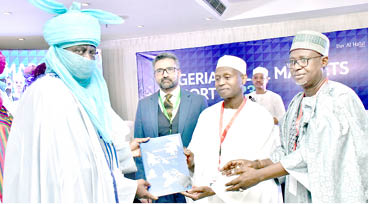Stakeholders call for investments in halal market to provide jobs, grow economy
Stakeholders have voiced the need for increased investment in the halal sector of the Nigerian economy to drive positive economic growth and create jobs for the teeming youth. The call was made during the launch of the ‘2023 Nigeria Halal Markets Report’ yesterday in Abuja, which was organized by Dar Al Halal in partnership with […]

Stakeholders have voiced the need for increased investment in the halal sector of the Nigerian economy to drive positive economic growth and create jobs for the teeming youth.
The call was made during the launch of the ‘2023 Nigeria Halal Markets Report’ yesterday in Abuja, which was organized by Dar Al Halal in partnership with Dinar Standard.
The event had in attendance the Emir of Kano, Aminu Ado Bayero, the Emir of Zazzau, Alh. Ahmed Nuhu Bamalli, the Minister of Finance, Budget and National Planning, Zainab Shamsuna Ahmed, the Vice President of Islamic Development Bank, Dr Mansur Muhtar, among other international partners.
The CEO of DinarStandard, Rafi-uddin Shikoh, said the report aims to provide a comprehensive view of the halal market opportunities and roadmap for Nigeria to build awareness with stakeholders to realize its potential.
Stakeholders call for investments in halal market to provide jobs, grow economy
Political inclusion key to sustainable democracy in Nigeria – Prof. Sulaiman
Shikoh stated that Nigeria is the second largest consumer for halal products and services in Africa worth $1.7bn which is expected to grow by 10 percent annually.
“For Nigeria, this presents a tremendous interest for foreign investment in the consumer market and you have a very big domestic market to attract investors as well as help developed entrepreneurs and start up an ecosystem around it.”
He noted that being a high importer of the consumer products, which is putting strain on the country’s foreign exchange, right investment in the sector would accelerate the economy with $1.6bn projected to be added in the economy yearly.
He emphasized that the investment in halal is beyond food as it cuts across Fashion, Cosmetics, Pharmaceutical, Travel, Media and Recreation which can all help to finance Islamic banking.
“You have a fast growing and developing Islamic finance ecosystem, even the Islamic fintech will be incorporated and these are strengths that can be leveraged.”
On his part, the CEO of Dar Al Halal, Muhammadu Dikko Ladan, noted that Nigeria is full of opportunity and the country does not have to be 100 percent Muslim to enjoy and take advantage of the halal market.
He said Nigeria has all the institutions and it is working with traditional rulers to push for a lot of reforms, policy, support and galvanising groups and individuals to create awareness on the halal market.
The minister of finance, Zainab Shamsuna Ahmed, emphasized on the need for government to create the right regulation and the enabling environment for entrepreneurs, organisations and associations to strengthen the entire value chain.
She described the halal market as one of the fastest growing markets in the global economy, adding that the report would empower government entities, industries and investors to grow Nigeria’s presence in the global halal economy and increase consumers awareness and foster partnerships to help Nigeria tap into halal economy opportunities.
With technology encroaching on spheres of the economy, the Director General of the National Information Technology Development Agency (NITDA), Kashifu Inuwa Abdullahi, said Islamic scholars to give their views on meat and plant grown from stem cell and other technological innovations that Muslims are shying away which are, however, making lives easy.
He also urged Muslims to use technology to promote Islamic cultures and tradition to challenge the encroachment of western cultures on society.
The Vice President of Islamic Development Bank, Dr Mansur Muhtar, called for cooperation with stakeholders for the bank to launch concrete initiatives that would support halal industry and facilitate trade and investment in halal products and services.
The Emir of Kano, the Emir of Kano, His Royal Highness, Aminu Ado Bayero noted that by investing in the halal market, businesses and investors can play pivotal roles in promoting social and environment sustainability as halal products and services are produced using sustainable and ethical best practices.
He said this would enhance Nigeria’s global reputation and contribute to its economic development.
